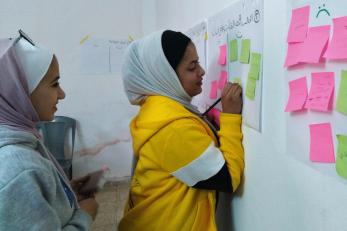Girls empowered: Mapping energy and tech access in rural Jordan

"Many people just see us as young girls, not capable as researchers, and so would advise us that our time is best spent focusing on school." This is a challenge that faced Dania, 16 years old, and her peers, as they embarked on a journey to research energy access and use patterns in their village of Rihab in Mafraq. Their work ultimately revealed opportunities for improved safety and access to energy, technology and information among Syrian and Jordanian youth.
"Energy In Emergencies: Mitigating Risks of Gender-Based Violence" (EEMRG) is a Mercy Corps program to improve safety and opportunities for women and girls through access to safe, clean and modern energy in crisis and post-crisis settings. Funded by the U.S. Department of State, EEMRG partnered with refugee and host communities in Jordan, Uganda and Afghanistan to develop a comprehensive set of tools for inclusive energy programming. The program recognizes that access to energy is a human right, a Sustainable Development Goal, and an enabler of humanitarian objectives.
One billion people still live without electricity and more than three billion lack access to clean cooking globally. Conflict and displacement jeopardize safe and reliable energy access; women, girls, and marginalized groups such as refugees face the greatest barriers to safe lighting, heating and cooling, and cooking fuel. In Jordan, both refugee and host communities struggle with energy affordability at the household level and to maintain adequate power, heat and light in community spaces like schools and streets.
Mercy Corps Jordan prioritizes working with adolescent girls and empowering them as leaders in their communities. Our staff employed a human-centred and girl-led design method, recruiting nine girls in Mafraq to develop a tool to capture differential energy access and control in homes and public spaces.
The team of girls developed, tested and iterated the tool over three months with peers. They succeeded in producing a research tool that is part of a new Inclusive Energy Access Handbook being used by humanitarian workers globally. In addition, the girls creatively shared their learnings around energy use disparities between boys, girls, men and women at home in a play they performed for community leaders. Their research highlighted the importance of energy in everyday activities, especially on the household level. “It never occurred to me how much we rely on energy,” said Dania. “Without energy, we have nothing.”
On a personal level, the project boosted the teenagers’ skills and confidence. “My sense of self-confidence increased, it took courage to go out and interview those who are younger and older than us,” said Fatimeh, a 15-year-old from Syria.
The new handbook, including the girls’ tool with full instructions, is available in both English and Arabic. Practitioners and policymakers can also register for Inclusive Energy Access 101, a free online course and introduction to the field of inclusive energy and planning.